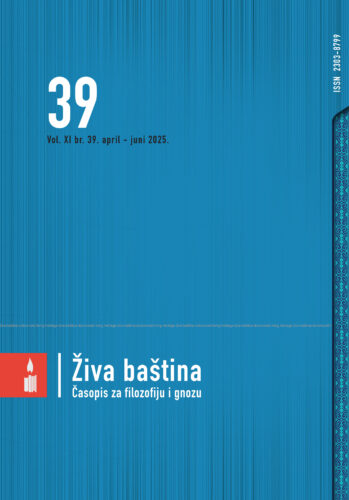UDK 1:28
“Tada će shvatiti, kada se zastor podigne, da su jedino Boga voljeli ali su bili pokriveni imenom stvorene stvari”.
Chittic ovaj članak završava gore citiranim riječima od Ibn Arebija koje u biti sažimaju cjelokupnu Ibn Arebijevu i sufijsku filozofiju ljubavi a kroz nju filozofiju stvaranja i uopće smisla postojanja. Namjera ovoga rada jeste pojasniti kako ovako zamršena i komplicirana epopeja ljudskog bivanja nije ništa drugo do jedna jednostavna i veoma uproštena igra ljubavi između Wujuda(Postojanja/Boga) i ‘adama(nepostojanja/svega osim Boga). Ljubav je uvijek težnja i želja za nepostojećim, onim što nemamo i čega nema. S obzirom da osim Boga istinski ništa ne postoji i da Ga istinski nikako ne možemo spoznati odnosno da On za nas uvijek ostaje Nepoznat, Skriven i ‘Nepostojeći’ ljubav neprekidno traje i neprestano nas gura, pokreće i usmjerava. Međutim, ono što volimo, čemu težimo i što nas privlači samo je locus ili ‘posuda’ manifestiranja, pokazivanja, otkrivanja i raskrivanja Božijeg tako da naša ljubav prema toj ‘posudi’ odnosno predmetu naše ljubavi jeste ustvari ljubav prema Onome koji se pokazuje u toj ‘posudi’. Ljubav je sila kojom Bog Uzvišeni privlači, vuče i vodi sebi sav univerzum i sve što je u njemu. Međutim, jedino biće koje istinski može voljeti i u kome se ljubav može ostvariti jeste čovjek. Cilj stvaranja je spoznavanje Skrivene riznice odnosno ljubav prema Bogu a ta ljubav se ostvaruje postepeno i tren po tren kroz našu privučenost i zaljubljenost u locus Božije manifestacije odnosno stvoreno. Savršeni čovjek jedini u sebi može ostvariti Božansku ljubav kroz siromaštvo i spoznaju apsolutne ovisnosti o Njemu. I kako kaže Ibn Arebi, postoje oni koji znaju šta vole i Koga vole i oni koji ne znaju šta vole i Koga vole. Kada se uklone ‘posude’ i locusi Božije manifestacije svima nama će postati jasno da smo voljeli samo Njega a da smo mu davali raznorazna i raznovrsna imena.
Ključne riječi: Wujud, nepostojanje Božija ljubav, Ljudska ljubav, siromaštvo, Savršeni čovjek.
The Divine Roots of Human Love
William C. Chittick
Abstract
“Then they will understand, when the veil is lifted, that they loved only God – though they were veiled by the names of created things.”
Chittick concludes his article with Ibn Arabi's abovementioned words, which essentially encapsulate the entirety of Ibn Arabi's and Sufi philosophy of love – and through it, the philosophy of creation and the very meaning of existence. This paper aims to demonstrate how the seemingly complex epic of human existence is ultimately a simple, distilled play of love between Wujud (Being/God) and ʻadam (non-being/all that is not God).
Love is always a yearning and desire for the nonexistent – for what we lack and what does not exist. Given that nothing truly exists except God, and that we cannot truly know Him (for He remains forever the Unknown, the Hidden, and the “Nonexistent” to us), love perpetually endures, ceaselessly driving, moving, and guiding us. However, what we love, what we yearn for, and what attracts us are merely loci (mazhar) or “vessels” for the manifestation, disclosure, and revelation of the Divine. Thus, our love for these “vessels” (the objects of our affection) is in truth the love for the One who reveals Himself through them.
Love is the force by which God the Exalted draws, pulls, and guides the entire universe and all within it. Yet, the only being capable of truly loving – and in whom love can be fully realized – is the human being. The purpose of creation is to know the Hidden Treasure (i.e., to love God), and this love is actualized gradually, moment by moment, through our longing and love for the loci of Divine manifestation (creation). The Perfect Human (al-insan al-kamil) alone can embody Divine love through poverty (faqr) and the realization of absolute dependence on Him. As Ibn Arabi states, there are those who know what they love and Whom they love, and those who do not. When the “vessels” and loci of Divine manifestation are removed, it will become clear to all that we loved only Him – though we called Him by diverse and manifold names.
Keywords:
Wujud (Being); non-being; Divine love; human love; poverty (faqr); Perfect Human (al-insan al-kamil)

